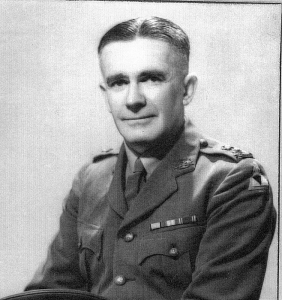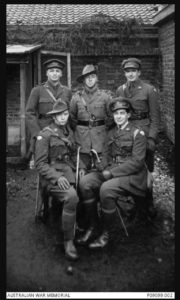Anketell, Michael Joseph, Lieutenant-Colonel , Commanding Officer, 2/4th Machine Gun Battalion

LIEUTENANT-COLONEL MICHAEL JOSEPH ANKETELL
COMMANDING OFFICER, 2/4TH MACHINE GUN BATTALION
10.10.1890-13.2.1942
On 7th November 1940 it was announced by the Minister for the Army, Francis Forde that Lt-Col M.J. Anketell was to form and train the 2/4th Machine Gun Battalion. It was obvious from the outset that Lt-Col Anketell would leave his own indelible stamp upon this WA raised Battalion.
Towards end of November 1940 an advance party of 12 officers and 12 NCO’s from 2/4th Machine Gun Battalion marched in to No. 2 Camp at Northam. Two days later they were joined by 394 other ranks. Another 262 men arrived on 4 December 1940.
The Commanding Officer, Lt-Colonel Michael Joseph Anketell was aged 50 years. His military pursuits began 3 March 1926, when aged 25 years he volunteered with the A.I.F. He departed Australia for overseas service on 20 January 1917 with 7th reinforcements for the 44th Battalion.
By January 1918, 22 months following his enlistment, Anketell had risen to the rank of Lieutenant.
On his return to Australia in 1919, Michael Anketell joined the Australian Military (Militia) where he eventually rose to the rank of Lt-Col. He was appointed to command the 28th Battalion in February 1937.
In addition to his military pursuits, Anketell had always been a very keen and dedicated sportsman and competitor. He was a founding member of the YMCA in Western Australia. In 1913 he travelled interstate to compete in team gymnastics. He took out the highest individual aggregate.
In 1929 Michael Anketell again in gymnastics won the Senior Grade Paterson Cup. As well, he played ‘A’ Grade Football, in the WAFL, ‘A’ Grade cricket and was a keen yachtsman.
His obsession with physical fitness was the cause of many a tired muscle and footsore machine gunner after some of his marathon battalion training marches.
The men said of ‘Mick’ Anketell, their Commanding Officer
“he trained very, very hard himself and never asked anybody to do something he wouldn’t do himself. Before we went on leave, we would have to do an 18-mile route march and he was great on that”.
“Anketell wanted men who were pretty active and did not pick men who he thought were a bit too old. If men were interested in sport he grabbed them. We had a crackerjack football team which won the competition in Adelaide.”
Whilst at Northam, the unit formed a cricket team to participate in the local competition.
Anketell also sought men with musical experience for a bugle and drum band.
The unit also adopted a fine-looking kelpie type dog named ‘Gunner’.
Anketell trained the men pretty hard at Northam. Digging trenches, climbing slopes, crossing the Avon River with our packs (without getting wet). There was no evading training and tasks. There was always next week. The Battalion looked up to him and were nicknamed ‘Anketell’s mountain goats.’
On 4th March the battalion headed up by Lieutenant-Colonel Mick Anketell began a 4-day march from Northam to Perth. From Perth the men headed for a bitter winter based at Woodside in the Adelaide Hills. ‘Anketell’s mountain goats’ were further toughened with exercises on Mount Lofty’s steep slopes.
In October the 8th Division were deployed ‘up north’. Along with the 23rd Brigade the 2/4th Machine Gunners headed by train to Alice Springs. Here they were transferred by truck convoy to Darwin. The 8th Division’s other two brigades were in Malaya and Singapore.
Based at Winellie the 2/4th were allocated a large defensive zone of beaches, swamps and creeks between Nightcliffe, Lee Point and Shoal Bay. The wet season caused flooding in the camp. There was an outbreak of dengue fever and a raised danger of crocodile attacks; ‘Gunner’ was a victim of such an attack.
Under Anketell, the men continuing their training including machine gun-firing exercises.
On the morning of 7th December 1941, Pearl Harbour was attacked by Japan. At the same time Japan attacked Thailand, Philippines, Guam, Hong Kong and Malaya. Japan’s advance soon began towards Singapore.
On 8th December 1941, Prime Minister John Curtin announced that Australia was at war with Japan.
The original plan to sail from Darwin to Singapore via Port Moresby was changed after Japan attacked Rabaul. The 2/4th headed out of Darwin south to Sydney. The men became sure they were now going to Singapore and thrilled about it.
On the 24 January 1942 the Battalion landed at Singapore with 942 men of all ranks disembarked alongside 1907 untrained reinforcements for other units. In little more than 3 weeks, most of them would either be dead or captured as POWs. Lt-Col Michael Joseph Anketell was one of those who died. He was badly wounded on 12th February, evacuated by ambulance to Alexandra Hospital but failed to regain consciousness and died the following morning.
Those who had survived death and were now POWs were greatly saddened to learn of ‘Mick’s’ unexpected death. He had been their leader and always so fit. For decades it was rumoured Anketell was bayoneted by the Japanese at Alexandra Hospital, but this has been officially disputed by hospital staff attending him.
Lt-Col M.J. Anketell had ensured the 2/4th were prepared for war. He had imparted valuable experience with his own WWI service and the question of the Battalion’s physical fitness and training could not be doubted. ‘
Anketell’s mountain goats’ were about to embark on 3 1/2 years of hell.

Group portrait of five Australian junior officers from the 44th Battalion somewhere in France. Identified but positions unknown are 2nd Lieutenant (2Lt) Cyril Richard Cornish, of Midland Junction, WA; 2Lt Michael Joseph Anketell, of Perth, WA; 2Lt Charles Richard Davies, MM, of Perth, WA; 2Lt John Yule, of Perth, WA and Lt Aubrey Clarence Crawley, of Perth, WA. Lt Crawley was killed in action on 17 February 1918.
